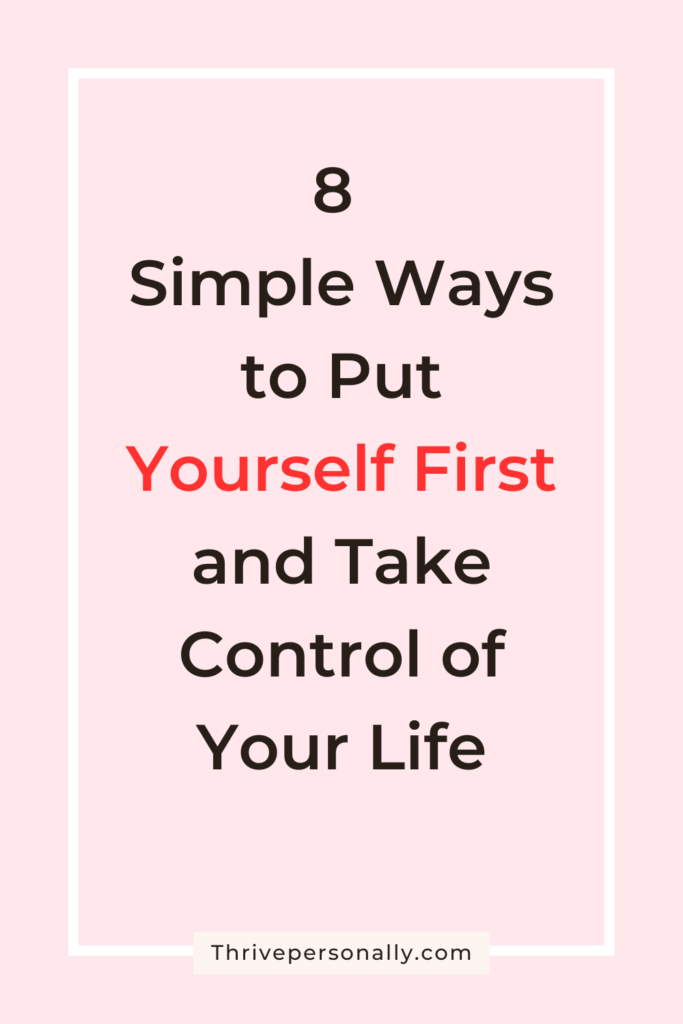Learn how to put yourself first without feeling selfish by reading this.
It is easy to get caught up in taking care of others but never giving yourself that same advantage. While helping those around you is great and necessary, you should always put yourself first.
Putting your needs first allows you to find happiness in helping others. When you allow your life to run at its finest, you can build better relationships with others by taking care of your responsibilities.
If you never put yourself first, you may experience resentment, burnout, and fatigue. When you understand how your mental health plays a role when helping others, you can show up stronger and more empowered. Focusing on yourself allows you to spread positive energy to those around you.
Putting yourself first is the key to living your best life. When you find your happy medium, you can better others because you are happy and thriving yourself.
By reading this article, you are allowing yourself to learn how to take control of your life. If you learn to put yourself first, you’ll open yourself up to a happier life.
8 Simple Ways to Put Yourself First and Take Control of Your Life
1. Know Your Needs and Wants

Knowing your needs and wants can help you learn how to put yourself first. When you know your needs, you learn how to take control of your life. Ask yourself these questions when you want to know your needs.
What areas of your life do you feel you lack?
How do you want your life to look?
Once you know what you want out of life, you can better your situation. You should know your emotional and physical needs. These needs include but are not limited to relationships, mental health, career, fitness, etc.
Write down your thoughts in a journal or list. Writing things down can help you later when you feel stuck again. Start by taking 30 minutes to yourself during the day or week. While you are in this time, write whatever is on your mind.
What do you want for your career? Who do you want to surround yourself with? What about you don’t like? Write anything that pops into your head.
Writing down your thoughts can be very therapeutic and help you! You will start to notice patterns when you write down your thoughts.
Take it a step further by learning the difference between wants vs. needs. When you want something that will only benefit you for a week, such as a new tech gadget or food from your favorite restaurant, ask yourself if you need it.
Oftentimes, we want things that will not benefit us in the long run. Try focusing on your needs that will make you happy, such as emotional needs.
Learning your needs will allow you to know how to put yourself first.
Read Also: 12 Simple Techniques to Clear Your Mind
2. Learn to Say No
Learning how to say no can be difficult, but it is necessary when taking control of your life. Let’s say someone asks you for a favor that will leave you drained or busy. You can say no to someone when you know you need to focus on yourself.
Once you know how to say no, you allow yourself to focus on your needs. Here are some ways you can learn to say no.
Saying no doesn’t make you a horrible person that doesn’t like to help others.
Let’s say your coworker asks you to take on more work when you’re already busy with your work. You can say, “Thank you for bringing this to me. But I am dedicated to my current tasks and can’t take on more.”
Not only is this polite, but you are letting your coworker know you have things to do. Another way to say no would be, “Thank you for asking, but I will pass.”
You don’t need to give a reason why you want someone. If you feel more comfortable, you can give a quick explanation of why you can’t do this specific task.
When you say no to others, you’re allowing someone else to help that person. By saying no, you’ll have more time to take care of yourself.
Read Also: 15 Reasons Why Saying No is a Life Skill You Need to Learn
3. Setting Healthy Boundaries
Setting healthy boundaries is another way you can learn to take control of your life. Boundaries are limits you set for other people around how you expect to be treated. Boundaries can also help you focus on your wants and needs.
Once you set boundaries for others, you allow yourself to have enough time for yourself. When you don’t allow yourself to set boundaries, you may feel drained by your friends and family.
Learning how to say what you need is a great way to start setting boundaries. First, think about what areas you need help with boundaries.
Do you have friends that drain you when you’re together? How about family members that always ask for your help?
Once you know your areas that you need help with boundaries, tell those people how you’ll expect to be treated.
“I need some alone time in the evenings to focus on myself. I hope you can respect that.”
Using the word “I” helps you avoid blaming the other person. Once you set your boundaries, always remember that they are set.
You would be surprised how some people will push these boundaries to see how far they can go. As long as you remain respectful and stern, people will understand.
4. Practice Self-Care

Practicing self-care is how you allow your body to recharge itself. When you start doing activities that make you happy, you’re allowing yourself to feel your best mentally, emotionally, and physically.
If you don’t know where to start with self-care, try some of these activities.
For physical self-care, try to do activities that will better your health. Go for a walk, do yoga, or lift weights. You can start by doing an activity you enjoy, so you’ll want to do it again. Also, make sure you’re eating three healthy meals a day.
Try to fill your meals with vegetables, fruit, grains, and protein. Also, drinking water is a form of self-care. Make sure you’re drinking at least eight cups of water a day.
Emotional self-care is just as important as physical self-care. Take the time to check in with your feelings by writing in a journal. Take at least 30 minutes out of the week to do something you love.
That may be hanging out with your best friend or doing your favorite hobby. Make sure you set boundaries with others so you can have some “you” time.
Mental self-care is how you allow your mind to relax and clear. You can practice self-care by doing activities that make you have to think.
Read a book, play puzzles, or learn something new. Also, take a technology break where you allow yourself not to be on your phone or computer.
Practicing all three areas of self-care will allow you to take better care of yourself.
Read Also: 15 Simple Self-Care Ideas to Make Your Sunday Awesome
5. Make Time for Hobbies and Interests
We all have responsibilities that may cause you to neglect the things you love to do. When you take time for yourself and the things you love, you allow yourself to unwind.
Not only will you allow yourself to relax, but you’ll feel happy doing something you love. Maybe you enjoy painting, gardening, or playing an instrument.
When you give yourself time to do things you love, you feel happier overall. Also, when you accomplish tasks that you love, you build self-esteem.
You’ll start to set goals by doing your hobbies, even if they are small goals. After you finish a task that makes you happy, you’ll feel more confident in your abilities.
Not only will you feel more confident, but you may start pushing yourself more at work. Giving yourself time for fun allows you to grow yourself in many ways.
Read Also: 41 Fun Activities You Can Do All Alone
6. Stay Organized and Plan Ahead
Staying organized is how you allow yourself to take control of your life. When you know your week looks like, you can give yourself enough time to do things for yourself.
Start by planning out your week.
Grab a planner or use your phone as a planner. Write down what times you’re busy with work or taking care of things. Then, schedule time to do things for yourself.
When you plan out your week, you’ll force yourself to do things you want to do. I like to plan out every hour of my day so I know what I need to get done.
Start your week by planning what you need to do and what you want to do.
Also, write down things that make you happy. When you stay organized, you’ll notice you’re less stressed.
You won’t forget about things as much when you plan everything out. Try setting reminders for things you need to do for yourself.
Reminders will allow you to stay committed to yourself. Also, keeping your workspace clean will allow you to think clearer.
When you learn how to stay organized, you allow yourself to improve other areas of your life.
7. Practice Gratitude
Practicing gratitude is another way you can allow yourself to feel better. When you allow yourself to be grateful for the little things, you’ll feel happier.
An easy way to practice gratitude is by keeping a gratitude journal.
Every day, write down what you’re grateful for that day. It can be something as simple as your family being healthy or you getting enough sleep.
Not only will writing down what you’re grateful for help you notice the small things, but writing can also help you when you’re feeling down!
When you constantly allow yourself to be grateful, you are happier mentally.
Studies have shown that people who practice gratitude have less depression and anxiety.
Allows you to control your emotions better when something negative happens.
When you take the time to be grateful for yourself, you allow yourself to grow.
Read Yourself: 30 Gratitude Prompts to Help You See the Bright Side of Life
8. Seek Support When Needed

Life can be crazy, and you may not always know what you want. Don’t be afraid to ask for help when you need it. Oftentimes, we think we can do everything on our own and become stressed or overwhelmed.
Asking for help will allow others to give you different perspective and emotional support. When you allow others to help you, you allow yourself to grow through others.
Don’t be afraid to ask your friends, family, or even a therapist for help. Everyone needs help from time to time, so you aren’t alone.
You can also seek support by joining support groups online or even in-person. Support groups will allow you to help others, which benefits your mental health.
There are also many therapists, coaches, and counselors that can help you figure out what you need.
When you seek professionals, they’ll allow you to know your downfalls and better yourself.
Seeking support is crucial when you don’t know what you need. Just remember it’s okay to ask for help.
Conclusion: Taking Control of Your Life
How to take control of your life came down to small things that you can start doing today. Each way I listed was simple and will allow you to better yourself.
Putting yourself first came down to the ten simple ways I listed above. When you start to implement these changes into your life, you allow yourself to
Save the pin for later



